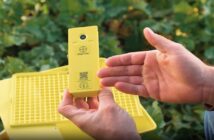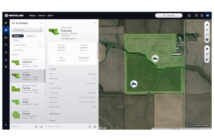A state-of-the-art soil station will be launched at Lamma. The system is in place on commercial farming operations in Scandinavia and Eastern Europe and is now being introduced into the UK.
Created by Estonian ag-tech company Paul-Tech, the station is being used by Leeds University as part of a regen cultivation study. The station is specifically designed to measure water and nutrient movement throughout the soil.
The station takes real-time readings of nutrient availability, soil water levels and soil temperature at depths of 8cm and 20cm. This can be combined with weather and satellite data to produce agronomic recommendations for farmers and growers, which are reported via an online dashboard.
Paul-Tech Chief Executive Mikk Plakk, believes the station will help farmers make more informed decisions about crop inputs and irrigation, leading to better soil and plant health, yield and cost savings. “Getting access to real-time, high frequency data from the soil station was vital for the Leeds University study and will be equally valuable for farmers,” he says.
For the study itself, initial results show that the minimal cultivated plots recorded a significantly larger nutrient release after fertilisation and higher nutrient availability at the 8cm mark compared to the ploughed plots, and nutrients were held around the rootzone for longer.
By contrast, water quickly drained through the ploughed soil, leading to a significantly smaller nutrient release at fertilisation and considerably fewer nutrients available to the plants at 8cm.
Soil temperature was also impacted by the cultivation method with the ploughed soil experiencing much larger temperature changes over the course of the trial.
“As the study continues, we expect to discover further insights into how different cultivation techniques impact on soil health, the environment, and the farmer’s bottom line,” adds Mr Plakk.
Dr Ruth Wade, research fellow at the university, is leading the trial. “The results coming from this regenerative agriculture plot trial will provide important data on the impacts of different farming systems both on the environment but also for the farm business,” she suggests.




